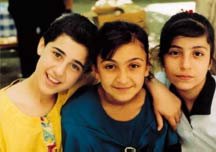|

Winter
1999 (7.4)
Page
13
Guest Editorial:
Perspective from Youth
Moving
Forward
by Fariz
Ismayilzade
  Less than ten years
ago, the youth in the USSR were considered to be some of the
main carriers of Soviet power. They were given the privileged
role of representing the happy generation in the happy country.
We were often reminded that the future depended on us, that we
must carry out this sacred task successfully. Less than ten years
ago, the youth in the USSR were considered to be some of the
main carriers of Soviet power. They were given the privileged
role of representing the happy generation in the happy country.
We were often reminded that the future depended on us, that we
must carry out this sacred task successfully.
Time passed. Who could have imagined that Azerbaijan would gain
its independence? Who could have imagined that Azerbaijani youth
would be free - free from Soviet propaganda, free to learn about
the world, free to be what they want to be?
Photo:
by Olga
Mammadova
Now the borders are open. Many young people have traveled and
studied abroad. They have encountered new people, ideas and values.
This leads to change in Azerbaijani society. Actually, sometimes
it's hard to tell if the transition period is changing the youth
or if the changed youth are transforming society.
How much have the youth in Azerbaijan really changed? And what
makes them different from the older generation?
One of the most notable differences is that the average energetic,
English - and computer - literate youth earns much more money
than his or her parents. Some young people work to pay tuition
at expensive, modern colleges; others do it to survive. Ten years
ago, no one would have asked a young person if he worked or not.
Now if you run into a friend you haven't seen for a long time,
you automatically ask. All other differences between the younger
and older generations derive from this change.
The collapse of the centralized Soviet economy and the disappearance
of many state - owned enterprises has led to widespread unemployment.
At the same time, the 1990s oil boom and the flow of foreign
investments to Azerbaijan has created many jobs that require
new skills - skills that most older people don't have. Job vacancies
at foreign companies tend to go to the youth, which means they
earn more money than their parents, who still work at low - paying
state positions. In many cases, a youth supports his entire family
because his parents are unemployed. Do you think that this young
person will depend upon his parents as much as he might have
in the past? I think not.
Today's Baku is saturated with Western culture, which promotes
self - reliance and independent thinking. This leads to conflict
within families. In conservative Azerbaijani culture, children
- especially girls - were not given this kind of freedom.
Youth today are more open, liberal, cosmopolitan and willing
to learn about other cultures. During Soviet times, our parents
learned to divide the world into "enemies" and "friends".
Today our youth travel abroad, make friends in various countries
and participate in youth camps and conferences. Instead of being
isolated, they are integrating themselves into the world family
- not to mention their involvement with the Internet.
Also, there's a higher level of patriotism and self - identity
among today's youth. During Soviet times, if our parents were
asked, "What's your nationality?" most would have responded
"Soviet". Traveling abroad, my parents were "Soviet",
and not "Azerbaijani". Today, we know that we are Azerbaijanis.
We are proud to show our national passport, our flag, sing our
anthem and say, "I'm from Azerbaijan."
Of course, we have no right to forget that some Azerbaijani youth
still live in refugee camps and have no access to education.
Some kids are homeless because there is no government social
policy to provide for them. Our youth in the regions have an
ideology vacuum that is often filled by radical religious ideas
or simply mob mentality.
As for negative changes in the post - Soviet period, I also have
to admit that a quality educational system collapsed along with
the Soviet propaganda. Our schools and universities can't compete
with the businesses, shops and enterprises that have arisen like
"mushrooms after the rain." Even though the level of
scholars remains high, the general educational level has fallen,
as it has throughout the former Soviet Union. However, libraries
and bookstores are still packed, new universities with modern
facilities are appearing and more and more young people want
to study abroad. More teenagers are involved with international
organizations, clubs and colleges.
Our youth have great potential. They can and will be the driving
force of reforms. My American friends always tell me that my
motivation and energy inspires them. But I am simply representative
of the many young Azerbaijanis who want a bright future and are
ready to work hard for it. No matter how difficult things are
now, our youth are energetic. Most importantly, young people
are the only segment of the population that will never agree
to turn back the wheel of history and return to Soviet times.
We are clearly going forward to build a democratic government
and civil society. This is where our future differs from our
past.
Fariz Ismayilzade,
21,
was a recipient of the Freedom Support Act Undergraduate Fellowship
at Wesleyan University in Connecticut (1998-99). He interned
at the Azerbaijan Embassy and the Center for Strategic and International
Studies (CSIS) in Washington, D.C. (Summer 1999) and currently
works as a Resource Center Coordinator at the Azerbaijani humanitarian
organization, Hayat.
From Azerbaijan
International
(7.4) Winter 1999.
© Azerbaijan International 1999. All rights reserved.
Back to Index AI 7.4 (Winter
1999)
AI Home |
Magazine
Choice
| Topics
| Store
| Contact
us
|

